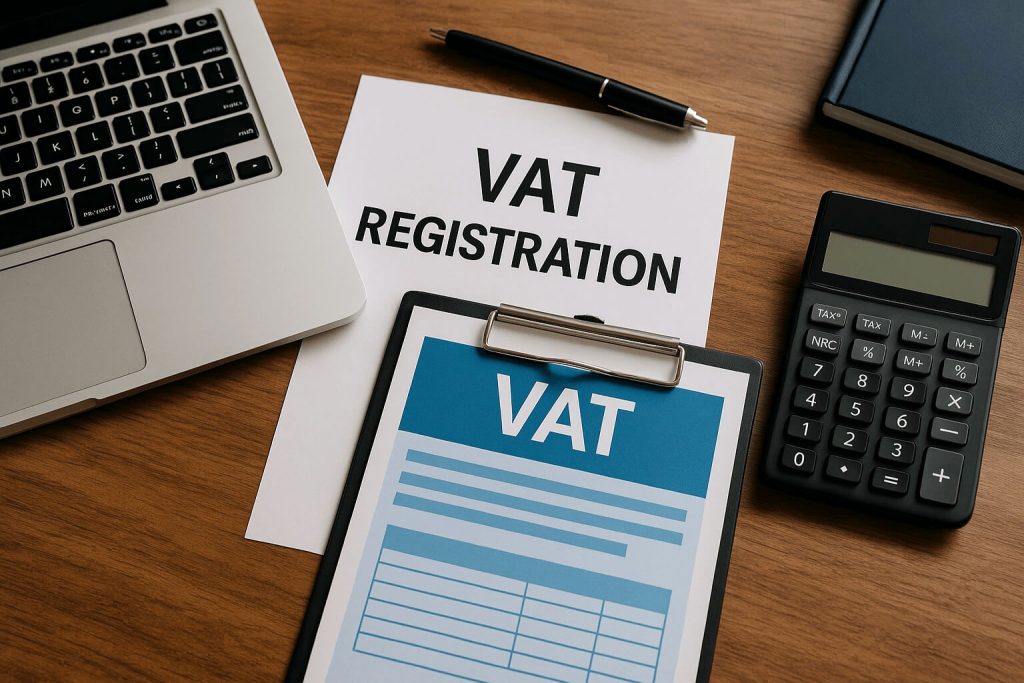VAT was introduced on January 1, 2018 as part of broader reforms aimed at economic diversification and reducing dependence on oil revenues. VAT has become an integral element of the GCC tax framework introduced by the Gulf Cooperation Council (GCC).
The UAE’s standard VAT rate is 5%, which remains one of the lowest in the world. VAT applies to most goods and services, with exceptions for specific categories subject to zero-rate or exemption rules.
What is VAT?
VAT is an indirect tax levied at each stage of the supply chain, from production to final consumption. Ultimately, it is the end consumer who bears the cost. Businesses registered for VAT act as collection agents on behalf of the Federal Tax Authority (FTA), charging VAT to clients and remitting it to the government.
Who Must Register for VAT in the UAE?
Businesses and entrepreneurs are required to register for VAT if:
- Their annual taxable supplies or taxable expenses exceed AED 375,000 (mandatory registration);
- Their annual taxable supplies or taxable expenses are between AED 187,500 and AED 375,000 (voluntary registration).
Entities with taxable supplies or taxable expenses below AED 187,500 cannot apply for registration.
VAT Registration Procedure
Registration is conducted online via the FTA portal and involves:
- Creating an FTA account.
- Submitting the application, including company information, business activity, and transaction details.
- Providing supporting documents, such as:
- Trade license,
- Shareholder ID copies,
- Supporting documents: contracts, tax invoices, declaration letters etc.
- Awaiting FTA approval and receiving a Tax Registration Number (TRN).
VAT Reporting and Payment
VAT-registered businesses must file VAT returns every 3 months, depending on FTA requirements. The VAT return must include:
- Total output VAT;
- Total input VAT (eligible for deduction);
- Net VAT payable to the government.
VAT return and payments are due within 28 days of the end of the tax period.
Zero-rated and VAT-Exempt Supplies
Some goods and services are either zero-rated or exempt from VAT:
Zero-rated (0%) — VAT is not charged, but input VAT is reclaimable. Examples:
- Exports of goods and services;
- International transportation;
- Education and healthcare;
- Certain precious metals.
VAT-exempt — No VAT is charged, and input VAT cannot be recovered. Examples:
- Financial services;
- Residential property rent;
- Local passenger transport.
VAT Non-Compliance Penalties
Common violations and associated fines include:
- Failure to register (when required) – AED 10,000.
- Late VAT return submission – AED 1,000 (first offense), and on the same date monthly thereafter, up to a maximum of AED 10,000.
- Late VAT payment – 2% penalty on the first day, +4% after 7 days, +1% daily (up to 300%).
- Incorrect reporting – AED 500 to 50% of understated tax.
- Failure to maintain records – AED 10,000 (first), AED 20,000 (repeat).
Case Study: VAT Obligations for a Trading Company
Suppose XYZ Trading LLC, an electronics company, exceeds AED 375,000 in annual revenue. The company is obligated to register with the FTA.
Registration trigger points:
- Taxable supplies or taxable expenses exceed AED 375,000 within the last 12 months;
- Forecasted revenue to exceed AED 375,000 in the next 30 days.
Documents needed: trade license, shareholder passport copies, and financials. Once registered and TRN is issued, all sales must include VAT.
Input VAT vs. Output VAT
- Output VAT: VAT added to sales (e.g., a smartphone sold at AED 1,000 incurs AED 50 VAT).
- Input VAT: VAT paid on purchases from suppliers. If a distributor charges AED 25,000 VAT on AED 500,000 goods, the company can deduct AED 25,000 from its output VAT liability.
Filing VAT and Meeting Deadlines
Let’s say the return deadline is April 28 for Q1 (Jan–Mar).
Figures:
- Output VAT: AED 25,000
- Input VAT: AED 10,000
Net payable VAT = AED 15,000
This amount must be paid by April 28 to avoid penalties.
Avoiding Fines
Typical mistakes:
- Missed registration – AED 10,000
- Late filing – AED 1,000 / 2,000
- Late payment – up to 300% penalty
Planning ahead is critical to stay compliant and avoid excessive costs.




